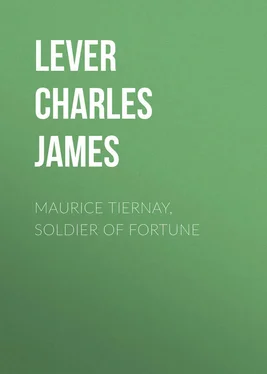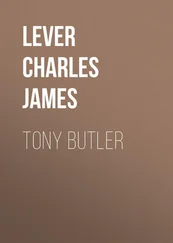Charles Lever - Maurice Tiernay, Soldier of Fortune
Здесь есть возможность читать онлайн «Charles Lever - Maurice Tiernay, Soldier of Fortune» — ознакомительный отрывок электронной книги совершенно бесплатно, а после прочтения отрывка купить полную версию. В некоторых случаях можно слушать аудио, скачать через торрент в формате fb2 и присутствует краткое содержание. Жанр: literature_19, foreign_antique, foreign_prose, на английском языке. Описание произведения, (предисловие) а так же отзывы посетителей доступны на портале библиотеки ЛибКат.
- Название:Maurice Tiernay, Soldier of Fortune
- Автор:
- Жанр:
- Год:неизвестен
- ISBN:нет данных
- Рейтинг книги:3 / 5. Голосов: 1
-
Избранное:Добавить в избранное
- Отзывы:
-
Ваша оценка:
- 60
- 1
- 2
- 3
- 4
- 5
Maurice Tiernay, Soldier of Fortune: краткое содержание, описание и аннотация
Предлагаем к чтению аннотацию, описание, краткое содержание или предисловие (зависит от того, что написал сам автор книги «Maurice Tiernay, Soldier of Fortune»). Если вы не нашли необходимую информацию о книге — напишите в комментариях, мы постараемся отыскать её.
Maurice Tiernay, Soldier of Fortune — читать онлайн ознакомительный отрывок
Ниже представлен текст книги, разбитый по страницам. Система сохранения места последней прочитанной страницы, позволяет с удобством читать онлайн бесплатно книгу «Maurice Tiernay, Soldier of Fortune», без необходимости каждый раз заново искать на чём Вы остановились. Поставьте закладку, и сможете в любой момент перейти на страницу, на которой закончили чтение.
Интервал:
Закладка:
Without stopping to examine my prize, or hesitating for a second, I entered the restaurant, and asked for M. Boivin.
‘Give your orders to me, boy,’ said a man busily at work behind the counter.
‘My business is with himself,’ said I stoutly.
‘Then you ‘ll have to wait with some patience,’ said he sneeringly.
‘I can do so,’ was my answer, and I sat down in the shop.
I might have been half an hour thus seated, when an enormously fat man, with a huge bonnet rouge on his head, entered from an inner room, and passing close to where I was, caught sight of me.
‘Who are you, sirrah – what brings you here?’
‘I want to speak with M. Bouvin.’
‘Then speak!’ said he, placing his hand upon his immense chest.
‘It must be alone,’ said I.
‘How so, alone, sirrah?’ said he, growing suddenly pale; ‘I have no secrets – I know of nothing that may not be told before all the world.’
Though he said this in a kind of appeal to all around, the dubious looks and glances interchanged seemed to make him far from comfortable.
‘So you refuse me, then?’ said I, taking up my cap and preparing to depart.
‘Come hither,’ said he, leading the way into the room from which he had emerged. It was a very small chamber, the most conspicuous ornaments of which were busts and pictures of the various celebrities of the Revolution. Some of these latter were framed ostentatiously, and one, occupying the post of honour above the chimney, at once attracted me, for in a glance I saw that it was a portrait of him who owned the pocket-book, and bore beneath it the name ‘Robespierre.’
‘Now, sir, for your communication,’ said Boivin; ‘and take care that it is of sufficient importance to warrant the interview you have asked for.’
‘I have no fears on that score,’ said I calmly, still scanning the features of the portrait, and satisfying myself of their identity.
‘Look at me, sir, and not at that picture,’ said Boivin.
‘And yet it is of M. Robespierre I have to speak,’ said I coolly.
‘How so – of M. Robespierre, boy? What is the meaning of this? If it be a snare – if this be a trick, you never leave this spot living,’ cried he, as he placed a massive hand on each of my shoulders and shook me violently.
‘I am not so easily to be terrified, citizen,’ said I; ‘nor have I any secret cause for fear, whatever you may have. My business is of another kind. This morning, in passing out to his carriage, he dropped his pocket-book, which I picked up. Its contents may well be of a kind that should not be read by other eyes than his own. My request is, then, that you will seal it up before me, and then send some one along with me, while I restore it to its owner.’
‘Is this a snare – what secret mischief have we here?’ said Boivin, half aloud, as he wiped the cold drops of perspiration from his forehead.
‘Any mishap that follows will depend upon your refusal to do what I ask.’
‘How so – I never refused it; you dare not tell M. Robespierre that I refused, sirrah?’
‘I will tell him nothing that is untrue,’ said I calmly; for already a sense of power had gifted me with composure. ‘If M. Robespierre – ’
‘Who speaks of me here?’ cried the identical personage, as he dashed hurriedly into the room, and then, not waiting for the reply, went on – ’ You must send out your scouts on every side – I lost my pocket-book as I left this a while ago.’
‘It is here, sir,’ said I, presenting it at once.
‘How – where was it found – in whose keeping has it been, boy?’
‘In mine only; I took it from the ground the same moment that you dropped it, and then came here to place it in M. Boivin’s hands.’
‘Who has taken care of it since that time?’ continued Robespierre, with a slow and sneering accentuation on every word.
‘The pocket-book has never left my possession since it quitted yours,’ was my reply.
‘Just so,’ broke in Boivin, now slowly recovering from his terror. ‘Of its contents I know nothing; nor have I sought to know anything.’
Robespierre looked at me as if to corroborate this statement, and I nodded my head in acquiescence.
‘Who is your father, boy?’
‘I have none – he was guillotined.’
‘His name?’
‘Tiernay.’
‘Ah, I remember; he was called l’Irlandais .’
‘The same.’
‘A famous Royalist was that same Tiernay, and, doubtless, contrived to leave a heritage of his opinions to his son.’
‘He left me nothing – I have neither house, nor home, nor even bread to eat.’
‘But you have a head to plan, and a heart to feel, youngster; and it is better that fellows like you should not want a dinner. Boivin, look to it that he is taken care of. In a few days I will relieve you of the charge. You will remain here, boy; there are worse resting-places, I promise you. There are men who call themselves teachers of the people, who would ask no better life than free quarters on Boivin.’ And so saying, he hurriedly withdrew, leaving me face to face with my host.
‘So then, youngster,’ said Boivin, as he scratched his ear thoughtfully, ‘I have gained a pensioner! Parbleu! if life were not an uncertain thing in these times, there’s no saying how long we might not be blessed with your amiable company.’
‘You shall not be burthened heavily, citizen,’ said I: ‘let me have my dinner – I have not eaten since yesterday morning, and I will go my ways peacefully.’
‘Which means straight to Robespierre’s dwelling, to tell him that I have turned you out of doors – eh, sirrah?’
‘You mistake me much,’ said I; ‘this would be sorry gratitude for eaten bread. I meant what I said – that I will not be an unwelcome guest, even though the alternative be, as it is, something very nigh starvation.’
Boivin did not seem clearly to comprehend the meaning of what I said; or perhaps my whole conduct and bearing puzzled him, for he made no reply for several seconds. At last, with a kind of sigh, he said – ‘Well, well, it cannot be helped; it must be even as he wished, though the odds are, he ‘ll never think more about him. Come, lad, you shall have your dinner.’
I followed him through a narrow, unlighted passage, which opened into a room, where, at a long table, were seated a number of men and boys at dinner. Some were dressed as cooks; others wore a kind of grey blouse, with a badge upon the arm, bearing the name ‘Boivin’ in large letters, and were, as I afterwards learned, the messengers employed to carry refreshments into the prison, and who, by virtue of this sign, were freely admitted within the gates.
Taking my place at the board, I proceeded to eat with a voracity that only a long fast could have excused; and thus took but little heed of my companions, whose solecisms in table etiquette might otherwise have amused me.
‘Art a Marmiton, thou?’ asked an elderly man in a cook’s cap, as he stared fixedly at me for some seconds.
‘No,’ said I, helping myself and eating away as before.
‘Thou canst never be a commissionaire, friend, with an appetite like that,’ cried another; ‘I wouldn’t trust thee to carry a casserole to the fire.’
‘Nor shall I be,’ said I coolly.
‘What trade, then, has the good fortune to possess your shining abilities.’
‘A trade that thrives well just now, friend – pass me the flask.’
‘Indeed, and what may it be?’
‘Can you not guess, citizen,’ said I, ‘if I tell you that it was never more in vogue; and, if there be some who will not follow it, they’ll wear their heads just as safely by holding their peace?’
‘ Parbleu! thou hast puzzled me,’ said the chief cook; ‘and if thou be’st not a coffin-maker – ’ A roar of merriment cut short his speech, in which I myself could not but join heartily.
Читать дальшеИнтервал:
Закладка:
Похожие книги на «Maurice Tiernay, Soldier of Fortune»
Представляем Вашему вниманию похожие книги на «Maurice Tiernay, Soldier of Fortune» списком для выбора. Мы отобрали схожую по названию и смыслу литературу в надежде предоставить читателям больше вариантов отыскать новые, интересные, ещё непрочитанные произведения.
Обсуждение, отзывы о книге «Maurice Tiernay, Soldier of Fortune» и просто собственные мнения читателей. Оставьте ваши комментарии, напишите, что Вы думаете о произведении, его смысле или главных героях. Укажите что конкретно понравилось, а что нет, и почему Вы так считаете.












